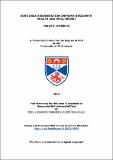Files in this item
Does area regeneration improve residents' health and well-being?
Item metadata
| dc.contributor.advisor | Graham, Elspeth | |
| dc.contributor.advisor | Feng, Zhiqiang | |
| dc.contributor.advisor | Boyle, P. J. | |
| dc.contributor.author | Archibald, Daryll G. | |
| dc.coverage.spatial | ii, 318 p. | en_US |
| dc.date.accessioned | 2014-06-19T14:40:57Z | |
| dc.date.available | 2014-06-19T14:40:57Z | |
| dc.date.issued | 2014-06-25 | |
| dc.identifier | uk.bl.ethos.605819 | |
| dc.identifier.uri | https://hdl.handle.net/10023/4899 | |
| dc.description.abstract | This thesis investigates the implications of area-based regeneration for residents’ health and well-being. The last three decades have seen significant investment in area-based initiatives in the UK to regenerate declining areas. However, there is a dearth of robust evidence on the impact that area regeneration practices have on health and health inequalities. This is particularly so in the case of the Scottish Area Regeneration Partnership (SARP) Programmes initiated in the mid-1990s, the evaluation of which was beset by a lack of baseline data and poor data collection generally. This study therefore seeks to address the lack of evidence by employing a rigorous mixed methods approach to evaluate the SARP programmes. Firstly, a quasi-experimental analysis of data from the Scottish Longitudinal Study (SLS) is undertaken. Comparator areas were identified using propensity score matching and a series of models was fitted to examine whether health outcomes of residents and migrants differed between regeneration areas and comparator areas. This is followed by a qualitative study exploring experiences of regeneration, carried out to provide insight into the results of the quasi-experiment. The findings provide no evidence that the programme had a positive impact on the health and well-being of SARP area residents relative to comparator area residents, and moreover, suggest that the programme may even have had a negative impact. Nor do they support the often stated hypothesis that those who move out of regeneration areas have done so because they have benefited from the programme and been replaced with residents who are likely to be more deprived. In addition, interviews with regeneration professionals and residents found that smaller initiatives overlapped with the SARPs, making it difficult to isolate the impacts of the programme under study. The conclusion reflects on the implications of these findings for the evaluation of public policy programmes. | en_US |
| dc.language.iso | en | en_US |
| dc.publisher | University of St Andrews | |
| dc.subject | Area regeneration | en_US |
| dc.subject | Health and well-being | en_US |
| dc.subject | Health inequalities | en_US |
| dc.subject | Scotland | en_US |
| dc.subject.lcc | HT178.S3A8 | |
| dc.subject.lcsh | Urban renewal--Health aspects--Scotland | en_US |
| dc.title | Does area regeneration improve residents' health and well-being? | en_US |
| dc.type | Thesis | en_US |
| dc.contributor.sponsor | Economic and Social Research Council (ESRC) | en_US |
| dc.contributor.sponsor | NHS Fife | en_US |
| dc.contributor.sponsor | Fife Council | en_US |
| dc.type.qualificationlevel | Doctoral | en_US |
| dc.type.qualificationname | PhD Doctor of Philosophy | en_US |
| dc.publisher.institution | The University of St Andrews | en_US |
This item appears in the following Collection(s)
Items in the St Andrews Research Repository are protected by copyright, with all rights reserved, unless otherwise indicated.

